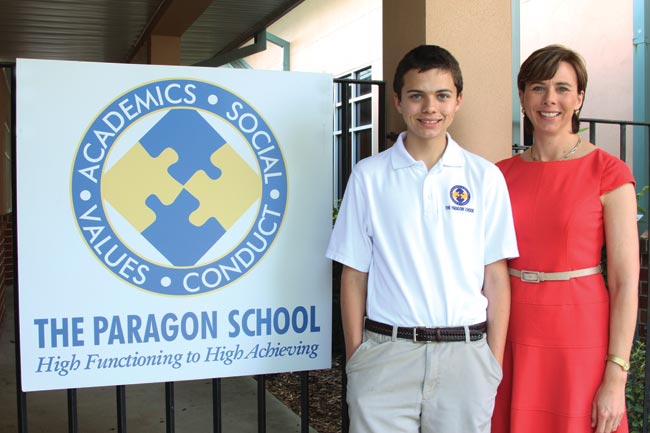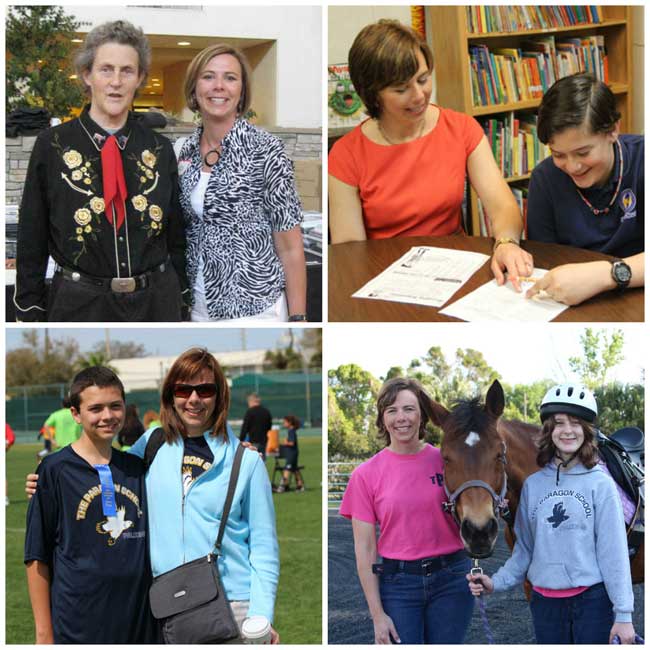
Within the light-filled classrooms of The Paragon School in Orlando, Fla., students receive individualized instruction in a small-group setting. They take regular music classes and socialize through team sports and extracurricular clubs. In addition to traditional academics, they participate in vocational activities and community-based internships designed to prepare them for life beyond school. The teaching staff is warm and nurturing, the atmosphere inclusive.
It’s everything that Helen Leonard, BS’91, ever hoped for in an academic environment for her son Tony, 16, a Paragon student. That’s because she created it.
The Paragon School, which serves children with autism spectrum disorder or Asperger’s syndrome, is Leonard’s response as a mother and educator to autism. With the disorders now affecting one in 88 children according to the Centers for Disease Control—up from one in 110 in 2009—the call to action is more vital than ever. She joins an army of fellow parents, educators and researchers working diligently to improve the lives of children with autism and those of their families.
When her son was diagnosed with autism spectrum disorder before age 2, Leonard and her husband Tony, BE’90, pursued every early intervention available. They eventually enrolled their son in a local charter school for children with autism, where he thrived. But between Tony’s fourth and fifth year at the school, his development began to outpace what the program could offer. The curriculum was designed for children with moderate to severe autism and offered only a special diploma, whereas Tony was high-functioning and better suited for a more academic track.
The Leonards investigated public schools and special-needs private schools as a next step for Tony, but couldn’t find a good fit.
“After visiting the public school and meeting with the principal, I felt pretty good about it. But when we returned with our son, I could tell how uncomfortable he was there,” Helen Leonard remembered. “As we were walking back to the car, I said to my husband, ‘He’ll get by.’”Almost immediately, she had an “aha” moment.
“I realized ‘getting by’ was not good enough,” Leonard says. “Just getting by is not a goal in life, and we would never want that for our other son. Tony had worked so hard, and so many people had invested their time and resources to get him this far, that getting by was not acceptable. We had to find a program that would continue his progress while giving him the best educational experience possible.”
Leonard shared the dilemma with the director of Tony’s charter school, herself the mother of a child with autism, who struck a bargain. Tony could remain at the school another year if Leonard would start a new program to serve him and other high-functioning students with autism.
“She said to me, ‘Helen, if the mothers don’t do it, who will?’”
Leonard, who earned an elementary education degree at Peabody and a master’s in education at New York’s Bank Street College, accepted the challenge. Armed with 15 years’ experience teaching elementary and middle school students, she spent the next year teaching in the charter school’s K-1 classroom and learning the ropes of how the school was run. In 2007, she opened The Paragon School with her son, a dozen of his charter school classmates and five other children from the community as students.
Now in its sixth year, The Paragon School serves 65 students from kindergarten through high school. The teaching staff of 21 combines research-based methods and innovative strategies to help these high-functioning students maximize their potential. The Paragon School is accredited by the Florida Council of Independent Schools and the Florida Kindergarten Council.
Hallmarks of the Paragon learning experience include strong emphases on behavioral expectations, self-discipline, organizational skills and independence. Students receive daily instruction in reading, math, social studies and science, while setting individual education goals to target deficit skills. Occupational, speech, music and other therapies are integrated into the curriculum.
Paragon has grown slowly but deliberately, trying to meet demand for its services while keeping pace with teacher training and maintaining instructional quality, says Leonard, who serves as the school’s director. And demand for these services is high. Families have moved from out of state to enroll their children, and the school has received interest from parents of children with autism in other countries. The Paragon School’s accrediting body has even inquired about opening more locations elsewhere in Florida.
The Paragon School is filling a niche within Central Florida’s autism community. “What I’ve heard from parents is that programs for higher-functioning children with autism are few and far between,” Leonard says. “I think this is because many people believe the best setting for these children would be in the mainstream. But our students thrive by being in an environment where autism is the common denominator and they are not viewed for it at all.
“We don’t mention ‘autism’ much,” she says. “We’re just here as a regular school community, with the exception that the children have therapies built into their day. But they also get the components of education that children look forward to at school.”
Students strengthen their social skills through team sports, school clubs, field trips and parties. Paragon’s high school program offers either a standard high school diploma or a special diploma with vocational training. The latter speaks to a distinct school mission.
“The goal of our program is for each child to become a contributing member of society,” Leonard says. “The first step toward this is helping them to be able to meet their own needs.”
The school’s vocational training focuses on building up independent functioning and organizational skills so that students can follow a schedule and hold down a job. They get practice at this through Paragon’s school-run car wash, by caring for horses at the therapeutic riding program with which the school partners, and through work placements in the community. Students shelve books at a local library, fold towels at the YMCA, bus tables at a pizza restaurant and sort cans at a church food bank, among other tasks—jobs very much like those any high school student might have.

It’s about building experience, Leonard says, adding, “The purpose is for us to be able to track a series of skills a student is performing so that over time, we can show that he or she is employable.” The goal is for students to get additional vocational training following graduation through a county-sponsored program or transition directly into jobs.
“One of the things we often go back to in children with autism is that they tend to thrive with structure,” she says. “So we’re trying to train our students up in a structured way for independent living and a vocational future.”
In a meeting several years ago with Temple Grandin, the noted autism activist, Leonard asked for one piece of advice for running her school. “She said to focus on the vocational, because children with autism simply are not getting employed,” says Leonard, who took the advice to heart.
Something else she takes to heart is helping families like her own. “We worked so hard to pull together on our own all of the different therapies and tutoring and help that he needed,” Leonard remembers.
It’s a reminder that autism affects the whole family, she says.
“One of the greatest challenges for parents of children with autism is trying to piece together all of the components a child will need to be successful, which can be completely exhausting in terms of one’s physical and emotional energy.”
Schools like Paragon are designed to help.
Despite the daunting statistics surrounding autism, Leonard is hopeful for the future.
“I often tell people that this is the best time in history to have autism because of the level of awareness surrounding it,” she says. “The better known autism is, the more resources will be devoted to helping these individuals. And that is very exciting.”
Learn more about The Paragon School.